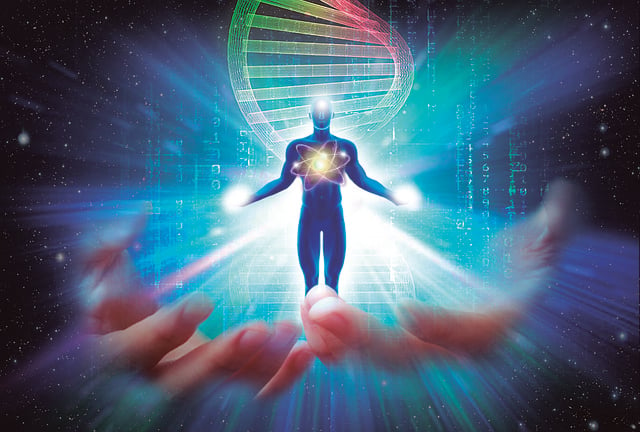Dualism sees mind and body as separate; Monism views them as unified. Dualism emphasizes distinction, while Monism emphasizes unity.
The concept of dualism versus monism is a fundamental debate in philosophy that explores the relationship between the mind and body. While dualism posits that the mind and body are separate entities, monism views them as a unified whole. This article will delve into the key differences between dualism and monism, providing a comprehensive understanding of these two philosophical concepts.
Key Takeaways:
- Dualism and monism are philosophical perspectives that differ in their views on the relationship between the mind and body.
- Dualism posits a separation of the mind and body, while monism emphasizes their unity.
- Dualism highlights the importance of the mind’s influence on the body, while monism argues for the irreducibility of mental phenomena to purely physical explanations.
- The debate between dualism and monism has implications for fields such as psychology, philosophy, and religion.
Dualism: Understanding the Mind-Body Separation

Dualism, a philosophical viewpoint, suggests that the mind and body are separate entities. This idea, traced back to thinkers like Descartes, proposes that the mind controls the body’s actions and that mental events correspond with physical ones. Descartes, a key proponent of dualism, believed the mind and body interacted through the pineal gland, seen as the soul’s center.
In dualism, the mind’s intentions can guide physical actions like moving a hand, and physical sensations can affect mental states. This philosophy underscores the separation of mind and body, rejecting the idea that mental experiences can be fully explained by physical processes. Instead, it emphasizes the intricate relationship between these two aspects of existence.
| Mind | Body |
|---|---|
| Controls the body’s actions | Physical entity with sensory experiences |
| Influenced by conscious intention and thoughts | Can influence mental states through physical sensations |
| Responsible for mental phenomena such as consciousness | Enables physical activities and responses |
As demonstrated in the table above, dualism posits a dynamic interaction between the mind and body, highlighting their separate roles and functions. This philosophical perspective offers a unique lens through which to explore the complexities of human existence and the relationship between our conscious experiences and physical being.
Monism: Emphasizing the Unity of Mind and Body

Monism, in contrast to dualism, emphasizes the unity of mind and body. This philosophical perspective rejects the idea of splitting man into separate entities and emphasizes that he is a unified organism. Monism can take the form of materialism or phenomenalism.
Materialism, a type of monism, views everything as physical matter. It argues that all mental events are solely physiological events, rejecting any notion of a separate mind or consciousness.
Phenomenalism, another form of monism, believes that physical objects can be reduced to mental objects. It suggests that the terms “mind” and “body” are simply different ways of describing the same event.
Overall, monism proposes that mental events are actually physiological events, highlighting the interconnectedness of the mind and body. It challenges the traditional notion of mind-body separation and promotes a holistic understanding of human existence.
Dualism vs Monism in Psychology
In psychology, there’s a lively debate between dualism and monism about how the mind and body relate. Monists, like behaviorists and biologists, argue that the mind is the same as the brain. They say mental processes are just the brain’s workings and can’t be studied independently. However, humanistic psychologists see things differently. They value personal experiences and think the mind is more than just brain activity. For them, it includes emotions, consciousness, and individual perspectives.
This clash between monists and humanistic psychologists shows how complex the dualism versus monism debate is in psychology. While some see the mind as inseparable from the brain, others believe it’s much more, encompassing subjective feelings and personal viewpoints.
Arguments for Dualism
Proponents of dualism present compelling arguments that support this philosophical view, highlighting various aspects that distinguish it from monism.
1. Religious Perspective
From a religious standpoint, dualism aligns with the belief in an immortal soul. Dualists argue that the mind, or soul, exists independently from the physical body and continues to exist after death. This perspective offers an explanation for concepts such as life after death and the existence of a higher spiritual realm.
2. Properties of Physical and Immaterial Stuff
Dualism proposes that physical and immaterial substances possess distinct properties that cannot be explained solely through materialistic means. While the physical body can be subject to scientific study and measurement, the unique properties of consciousness and mental phenomena, such as reason and subjective experiences, cannot be fully accounted for by purely physical explanations.
3. Irreducibility of Mental Phenomena
Dualists emphasize the irreducibility of mental phenomena, asserting that mental events are fundamentally distinct from physical events. Consciousness and the ability to reason, for instance, defy reduction to purely physical processes. These mental phenomena possess qualities that cannot be adequately explained through a materialistic framework alone.
| Arguments for Dualism | Key Points |
|---|---|
| Religious Perspective | Dualism is compatible with the concept of an immortal soul |
| Properties of Physical and Immaterial Stuff | Dualism argues for the unique properties of consciousness and mental phenomena that cannot be explained solely by materialistic accounts |
| Irreducibility of Mental Phenomena | Dualists highlight that mental events, such as consciousness and reason, cannot be fully reduced to physical processes |
Arguments for Monism
Monism, a philosophical idea, argues for simplicity in explanations, as suggested by Occam’s Razor. It questions the dualistic belief in a separate mind by proposing that the mind is just a function of the brain. Monists say mental processes are closely tied to brain activities, and understanding the mind comes from studying the brain itself.
Another monist argument, epistemological idealism, suggests we can only know one type of stuff. It rejects the idea of separate mental and physical substances, saying everything is interconnected. Cognitive psychologists support monism by comparing cognitive processes to computer software, showing how brain functions can explain mental activities like memory and reasoning. These arguments challenge dualism’s belief in a separate mind and body, emphasizing the interconnectedness of human experience.
Comparing Arguments for Monism
| Arguments for Monism | Description |
|---|---|
| Occam’s Razor | The principle of favoring simple explanations over complex ones. |
| Causal Relationship | Questioning the notion of a separate mind by arguing that the mind is a function of the brain. |
| Epistemological Idealism | Asserting that only one kind of stuff can be known about, rejecting the dualistic view of separate mental and physical substances. |
| Cognitive Processes | Drawing an analogy between cognitive processes and the functioning of computer software to understand the mind. |
Idealistic Monism: A Philosophical Perspective
Idealistic monism offers an intriguing alternative viewpoint to both dualism and materialistic monism. It presents a philosophical perspective that challenges traditional notions of the relationship between the mind and body. Let’s explore the key aspects of idealistic monism, including metaphysical idealistic monism, epistemological idealistic monism, and the quest for a conscious experience of unity.
Metaphysical Idealistic Monism
In metaphysical idealistic monism, the fundamental proposition is that all existing things are manifestations or expressions of a single mental or spiritual essence. This perspective suggests that the varied forms and phenomena we encounter in the world can ultimately be traced back to a unified underlying reality. It posits that the apparent diversity and complexity of existence are ultimately illusory, with all things sharing a fundamental interconnectedness.
Epistemological Idealistic Monism
Epistemological idealistic monism takes a different approach by focusing on what can be known rather than the nature of existence itself. This perspective asserts that only one kind of stuff can be truly known or understood. By limiting our knowledge to a single domain, epistemological idealistic monism aims to simplify our understanding of reality and explore the interconnectedness of phenomena.
Challenges in Achieving a Conscious Experience of Unity
While idealistic monism offers a compelling philosophical framework, achieving a conscious experience of unity presents significant challenges. The nature of consciousness itself is a complex and multifaceted phenomenon that eludes simple explanations. Additionally, questions surrounding the concept of selfhood and the boundaries of individual consciousness further complicate the pursuit of unity.
Despite these challenges, philosophers like Josiah Royce have presented arguments in support of idealistic monism, exploring the possibilities of a unified reality and conscious experience. By delving into the intricacies of consciousness and the underlying nature of existence, idealistic monism encourages us to reexamine our assumptions and explore the profound interconnectedness of the world.
Rescuing the Possibility of Conscious Unity
Achieving conscious unity, often termed “ocean consciousness,” is challenging due to consciousness always focusing on something external. This inherent intentionality makes it hard to grasp the unity underlying all experiences since objects of consciousness are separate from consciousness itself. Despite these challenges, researchers propose various paths to achieve conscious unity, such as directing attention to the interconnectedness of objects or understanding consciousness’s intentional nature.
One approach involves recognizing the interdependence of objects and focusing on their relationships instead of individual characteristics. Another proposal suggests understanding consciousness’s inherent intentionality, realizing its connection to objects, and recognizing the underlying unity. Practices like meditation and mindfulness also aid in cultivating conscious unity by enhancing awareness of present experiences, unveiling interconnectedness, and facilitating personal transformation. Achieving conscious unity offers insights into the interconnected nature of experiences, providing avenues for profound understanding and transformation.
The Debate Between Dualism and Monism: What’s at Stake?
The debate between dualism and monism holds immense significance in shaping our understanding of reality and the intricate relationship between the mind and body. The implications of accepting either dualism or monism extend across various fields, including psychology, philosophy, and even religion.
The Significance of the Dualism-Monism Debate
At the core of the debate lies the question of how we perceive existence and the fundamental nature of consciousness. Dualism, with its assertion of a mind-body separation, raises profound queries surrounding the existence of an immortal soul. This viewpoint challenges our understanding of life and afterlife, offering insights into existential themes that shape religious beliefs and practices.
On the other hand, monism raises crucial questions about the reducibility of mental phenomena to purely physical explanations. By emphasizing the unity of mind and body, monism challenges traditional conceptions of the mind and calls into question the validity of reducing mental experiences to neurological processes. This has significant implications for cognitive science, neuroscience, and our understanding of the nature of subjective experiences.
Implications of Accepting Dualism or Monism
The acceptance of dualism leads to a paradigm where the mind and body are distinct entities with their own properties and causality. This perspective has far-reaching consequences in fields such as psychology, where it shapes theories of consciousness, perception, and behavior. Additionally, dualism has implications for ethical and moral frameworks, touching on issues such as personal responsibility, free will, and the nature of human agency.
In contrast, accepting monism challenges the traditional mind-body divide and suggests that mental phenomena can be understood solely through physical processes. This perspective influences fields like neuroscience, as it emphasizes the material basis of mental states and behaviors. Monism also informs philosophical theories of consciousness, offering insights into the relationship between the subjective and the objective aspects of our experiences.
The Ongoing Impact of the Dualism-Monism Debate
The debate between dualism and monism continues to shape our understanding of the intricate connection between the mind and body, as well as broader questions regarding the nature of reality. The implications of this ongoing discourse extend beyond academic and philosophical circles, influencing our perspectives on identity, human nature, and the nature of consciousness itself.
| Dualism | Monism |
|---|---|
| Posits a separation of the mind and body | Emphasizes the unity of mind and body |
| Raises questions about the existence of an immortal soul | Challenges the reducibility of mental phenomena to purely physical explanations |
| Shapes theories of consciousness and perception in psychology | Influences neuroscience and theories of the material basis of mental states |
| Has ethical and moral implications, involving personal responsibility and free will | Offers insights into the relationship between the subjective and objective aspects of experiences |
| Impacts broader questions regarding identity, human nature, and consciousness | Informs philosophical theories of consciousness and epistemological frameworks |
Conclusion
In conclusion, dualism and monism present contrasting perspectives on the relationship between the mind and body. Dualism suggests a separation between the two, emphasizing the mind’s control over the body and the unique properties of mental phenomena. Monism, on the other hand, emphasizes the unity of the mind and body, rejecting a distinct separation and proposing that mental events are rooted in physiological processes.
The key differences between dualism and monism lie in their contrasting views on the mind-body relationship. Dualism sees the mind and body as separate entities, while monism views them as interconnected and indivisible. Dualism places importance on the mind’s control over the body, while monism argues for the irreducibility of mental phenomena to purely physical explanations.
FAQ
What is the difference between dualism and monism?
Dualism posits that the mind and body are separate entities, while monism views them as a unified whole.
Can you explain the concept of dualism in philosophy?
Dualism suggests that the mind and body exist as distinct entities and explores the relationship between them.
How does monism differ from dualism?
Monism emphasizes the unity of mind and body, rejecting the idea of splitting them into separate entities.
What are some arguments supporting dualism?
Proponents of dualism argue for the existence of an immortal soul and the irreducibility of mental phenomena to purely physical explanations.
What are some arguments for monism?
Supporters of monism highlight the simplicity of explanation, the principle of Occam’s Razor, and the belief that the mind is a function of the brain.
Are there alternative perspectives to dualism and materialistic monism?
Idealistic monism offers alternative views, including metaphysical idealistic monism and epistemological idealistic monism.
Can we achieve conscious unity despite the challenges?
Achieving conscious unity presents challenges due to the nature of consciousness and the issue of selfhood, but alternative proposals suggest it is possible.
What are the implications of the dualism-monism debate?
The debate impacts our understanding of reality, the relationship between the mind and body, and various fields like psychology, philosophy, and religion.
Source Links
- https://www.simplypsychology.org/mindbodydebate.html
- https://www.andrews.edu/library/car/cardigital/Periodicals/AUSS/1976-2/1976-2-02.pdf
- https://deanza.edu/faculty/ramireztono/phil01/Dualism and Monism.pdf
Image Credits
Featured Image By – rawpixel.com on Freepik
Image 1 By – Marcelo Carvalho Domingues from Pixabay
Image 2 By – Freepik









